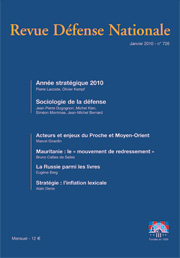The author gives a general overview of the special nature of France’s strategic posture, covering the three major factors that drive it—security interests, values and responsibilities—and considering the country’s current strategic options.
As part of its strategy of geopolitical synergy, www.diploweb.com is pleased to present this article, which first appeared in Revue Défense Nationale, January 2010.
THE business of Revue Défense Nationale is to be at the heart of strategic debate in France, and to make it easier for both our countrymen and our partners to understand French defence commitments in the service of peace and international security. The recently departed (and sorely missed) Pierre Chaunu regretted some twenty years ago that ‘France, tired of grandeur . . . is looking for increased security, and fewer initiatives, responsibilities and adventures.’ [1] While it was true in those days, France is today still in the forefront of a group of states which are promoting a new system of governance for the planet : one which acknowledges the realities of the twenty-first century, a system of governance which respects the interests of the greatest number. As [the Polish essayist Witold] Gombrowicz noted, to be French is also to be aware of something which is greater than just France itself.
But beyond these external realities there remains a domain in which France has an obligation that remains its priority : as for any other state, to defend its national interests. So to inaugurate this new-style Revue Défence Nationale, it seems to me appropriate to review French strategic interests, and to spark a debate on this theme.
As an opener, perhaps, allow me these three brief observations on methodology :
. Firstly, it is clear that each country has its own strategic equation, driven by its history, its geography and its own special character. [2] It is this equation which determines its definition of security and forms the basis of its strategic personality.
. As a consequence of this, each state organises its internal security around a dual contract : a political contract which links together the peoples and territories for which it is responsible, and a social contract which over time becomes the basis of its economic and social legitimacy. The coherence of its national identity rests on this dual contract.
. Finally, each state conducts its foreign policy in a way that is unique to itself, a synthesis of three main ingredients : its interests, its values and its responsibilities. It is these that determine its external commitments.
It is under these three headings that one can attempt to sketch out what France’s strategic interests are, and venture to examine the way in which they are currently thought through and organised in order to underpin the security of the country, and to influence world affairs.
France’s strategic equation
France’s strategic equation is conditioned by its geopolitical position at the western end of the Eurasian landmass. [3] In fact, mainland France lies at the intersection of three major geographic axes. This situation is engraved on our national consciousness ; it is something which has been the cause of our successes and our failures, and for many years it has determined our approach to security and power. A fourth axis overarches these three geopolitical axes : the universalist character of our involvement in world affairs. This conceptual pyramid defines the strong strategic personality of our country.
Some additional remarks may help further to clarify this geopolitical thinking. France lies at the western end of the continental plain linking the Atlantic Ocean to the Urals along the 50th parallel. Lacking a solid natural frontier, France has long established its lines of defence facing east : it has built fortifications, established lines of defence and concluded alliances with the Grand Turk or the Tsar. For France, the threat came from the east.
To this continental east-west axis was generally associated a further, opposite one : the transatlantic axis, the relationship with the North American continent. To France this western axis was the axis of reinforcements, strategic manoeuvre and depth ; an axis where French enterprises generally met British ones ; an axis of competition but also the Entente cordiale. For France, salvation has frequently come from the west.
And then perpendicular to these two, there has always been the southern axis—the Mediterranean and, via this sea and the Suez Canal, Africa and Asia. This axis gave France the freedom needed for the exercise of political influence and strategic breadth of vision. For France, adventure and prosperity have often been found to the south.
It is this tri-axial system that, implicitly, informs our national thinking. In former times it was all about issues such as our alliances and our strategic safeguards, notably facing east. For the past 50 years, however, France has no longer been in the front line of continental or maritime conflicts, and its strategic interests are no longer threatened in the first instance at its own physical frontiers.
The foundations of internal security
The foundations of our internal security are anchored, basically, in the vigour of a French national identity that has been gradually fashioned over a thousand years—initially Christian, then republican and secular, and now multiple. It is this identity (which we love to question so much) that goes a long way in explaining French specificity when we confront issues such as communitarianism or regional integration. Because the great importance that we attach to national unity is the consequence of our history : it is what doubtless distinguishes us from our European neighbours. It is, moreover, this characteristic tendency which confers a historic dimension and a long-lasting political character to the response developed progressively by our country to risks and dangers. This response is a global security strategy which is essentially unchanged since the edict of 1959 : it has as its central theme ‘. . . resistance to national crises’—what is now referred to as national resilience.
Some major advantages illustrate our national cohesion, which we see as a strategic imperative :
. Our current demographic vitality, which currently gives France the prospect of parity in population with Germany towards 2030.
. State-led industrial dynamism, a Colbertist legacy which is not doing at all badly in sustaining the economic fundamentals of French growth during the current period of systemic crisis in world financial governance. [4]
This internal dimension of France’s strategic stability forms part of its vital imperatives, of the crux of its identity, and of the basis of its national consensus. This self-aware internal power, supported by a jealously guarded sovereignty, characterises our country. Any factor that threatens or weakens this dimension is for France of strategic interest.
Interests, values and responsibilities : the motor of French external action
The objectives here are well known :
. French security interests. The strengthening of European defence and the stabilisation of our immediate neighbourhood.
. Values. The promotion of peace and security, and involvement in development while preserving diversity.
. Lastly, responsibilities. To promote appreciation of the pertinence of the French principles of international organisation, based as they are on a strong institutional, multilateral and cultural heritage.
These lie at the heart of the wide-ranging strategic survey in the latest White Paper on national defence and security.
As part of its relaunch, then, Revue Défense Nationale invites its readers to take part in the strategic debate under the three general headings sketched out above. We are looking to situate the questions of the European project, Atlantic solidarity and our commitment to the UN more clearly in this overall framework, because these three themes adequately explain our current strategic options :
. The autonomy of decision-making and action that lies at the core of our emphasis on technological sovereignty (specifically in the fields of nuclear weaponry and space).
. National influence and prestige, as demonstrated by wide French involvement in the UN, G8/G20/WTO and Francophonie. [5]
. European cooperation, which has turned defence against our neighbours into collective security (good-neighbourliness and regional integration policies).
There seems little doubt that from these major national options a certain concept of Europe and globalisation results, as a continuation of a certain idea of French security.
We must continue to combine and prioritize these major options in the twenty-first century world, because the strong points and the constraints that underlie France’s strategic posture also reveal our country’s strengths and weaknesses. They explain why the strategic model which France has developed continues today to make our country a special case. As we have said, it is a model which has evolved with time and experience. It is based on geopolitical and human realities, and it is modest in terms of forces and means : France accounts for just one per cent of the world’s population and three per cent of its turnover.
Nevertheless, this is a model that gives the country a real freedom of action in the world far in excess of what might be inferred from mere statistics. And it is the familiarity with these accepted contradictions, with this imbalance between ambitions and means, which defines the particular character of French strategic interests.
This is the paradox at the heart of the power which is proclaimed, and of the influence maintained, by France, in spite of some obvious weaknesses. It is the key to the special nature of French strategy which allows our country to punch above its weight in world affairs ; to participate actively in achieving a new system of organisation and governance of a planet of nine billion people ; and tenaciously to defend its interests, its values, its place and its ranking in world affairs . . . France’s cardinal strategic priority today must be to preserve this special reality, which derives from our most profound identity.
France’s strategic history has been defined by the advantages and constraints of its geopolitical position. Like many other countries, France’s history has been a consequence of its geography. That accounts for its current strategic personality, and still conditions its reflexes when it comes to homeland security and the defence of the population. We must not forget that, like the countries which surround it, France bases its actions in the field of security on the defence of its interests and values, not only as it sees them today, but also with regard to the experience acquired across the centuries, and the responsibilities it has inherited from its historic past.
The debate is joined. What do you, our readers, think ?
Copyright janvier 2010-Dudourcq/Défense nationale
Revue Défense Nationale

Published since 1939 by the Committee for National Defence Studies, Revue Défense Nationale has since then concerned itself with looking at new ideas on the big national and international issues from the viewpoint of security and defence. Its editorial independence allows it to participate actively in revival of the strategic debate in France and in promoting it in Europe and the rest of the world. www.defnat.com See
Pour ne rien rater de nos nouvelles publications, abonnez-vous à la Lettre du Diploweb !
[1] La France (Paris : Robert Laffont, 1982).
[2] Le génie de la France, demain’, Défense Nationale, July 1989.
[3] ‘À la charnière’, Politique étrangère, June 2002.
[4] ‘Penser la France au XXIe siècle’, Agir, no. 34, April 2008.
[5] Editor’s note : the term Francophonie refers to the group of states and governments that have French in common.
Direction

Directeur, P. Verluise
Conseil scientifique
Mentoring et coaching géopolitique
Présenter le Diploweb.com
Charte du site
Auteurs
Proposer un article
Retrouvez la chaîne Diploweb sur :











